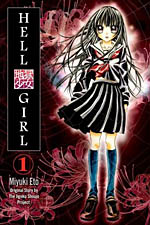 By Miyuki Eto
By Miyuki Eto
208 pages, black and white
Published by Del Rey
Sometimes you read a book because the initial hook sounds too good to ignore. That was certainly the case in Hell Girl, where the idea of people using a website to send other people to hell (but at the cost of their own soul) seemed like a fun take on an old chestnut, and seemed to promise at least a slight exploration at the idea of, “How much are you willing to pay to change your life?” What I found, though, was anything but that.
Ai Enma has a special website, one that only appears online at midnight. During that time, you can type in the name of the person who is tormenting you, and in return Ai will appear and take them to hell. But if you have to give up your own soul as well. is it really worth it? Just how bad does your situation need to be in order to take such a final solution?
Hell Girl is based on a hit animated series in Japan, and I can only hope that there’s more subtlety or at least style on board over there. The book starts out well enough, telling the story a schoolgirl who get manipulated and blackmailed by a fellow student that gets a thrill over tormenting our protagonist. Finally, her life in shambles and pressed to the brink, she summons up Hell Girl to do what she’s unable to do on her own. And then… the second story begins, and while it’s in a different location and profession, it’s the exact same story. Five times, in fact, by the time the volume is gone. With each iteration, the story gets less interesting because there isn’t really anything new brought to the table to disguise that it’s a one-note concept. Even the situations themselves are lackluster and uninspired; the second a young protégé pastry chef opens up her own bakery instead of joining her mentor’s business, you can see exactly where the story is heading. This may be a book aimed at teenagers, but it feels too dumbed-down even for them.
 Strangest of all about Hell Girl‘s writing, though, is that one of the big hooks of the premise is virtually ignored. The price for siccing Hell Girl on your enemy is that your own soul is earmarked for going to Hell when you die. In four of the five stories, though, you’d think the punishment was nothing more than having to give up your favorite food for a week. The quickness in which it’s brushed off is disappointing, but it also rids the stories of a lot of power. If it’s apparently not that big a deal, you half-expect characters to trip over someone’s bag and send them to Hell as a result. The only real exception is the last two pages of the story about the girl whose pet dies because of a corrupt veterinarian, where at least there’s a little bit of a sad, “this is what I gave up” note to the conclusion. Generally speaking, though, it’s a massive disappointment, with so much great potential ignored.
Strangest of all about Hell Girl‘s writing, though, is that one of the big hooks of the premise is virtually ignored. The price for siccing Hell Girl on your enemy is that your own soul is earmarked for going to Hell when you die. In four of the five stories, though, you’d think the punishment was nothing more than having to give up your favorite food for a week. The quickness in which it’s brushed off is disappointing, but it also rids the stories of a lot of power. If it’s apparently not that big a deal, you half-expect characters to trip over someone’s bag and send them to Hell as a result. The only real exception is the last two pages of the story about the girl whose pet dies because of a corrupt veterinarian, where at least there’s a little bit of a sad, “this is what I gave up” note to the conclusion. Generally speaking, though, it’s a massive disappointment, with so much great potential ignored.
Miyuki Eto’s art in Hell Girl is graced with some of the largest eyes I’ve ever seen in comics. I know that “large-eyed characters” is a stereotype that’s been unfairly applied to most manga, but never before have I seen it so liberally and ludicrously applied before. Characters look like they’ve got saucers for eyes, they’re so large, and it’s more than a little disconcerting to look at. About the one thing I really did find that I liked about Eto’s art was how she draws hair, especially Hell Girl’s, with the way it swirls around characters with almost a life of its own. It’s a little worrisome that it’s the one thing that seemed particularly innovative, really.
I desperately wanted to like Hell Girl but based on this first volume, I doubt I’ll be sampling another volume. The Hell Girl manga could charitably be called a massive disappointment, throwing away all its potential from its premise. It’s the problem with so many themed anthology stories, that you’re running the risk of becoming so repetitious that the reader just can’t bother with an additional story. There have been recent horror manga series lately that ran that risk but seemed to sidestep the problem quite nicely (Yuki Urushibara’s Mushishi and Housui Yamazaki’s Mail both leap to mind), but I can’t remember the last time I’ve seen one collapse quite so quickly or spectacularly.
Purchase Links: Amazon.com
